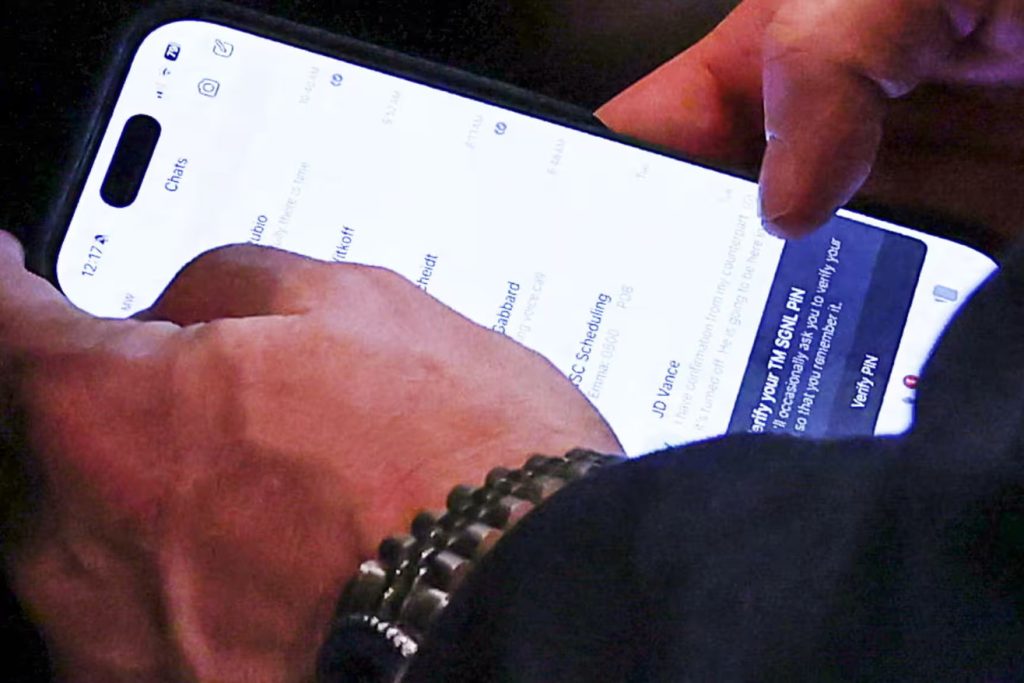Former national security adviser Mike Waltz was seen using a Signal-like messaging application during Wednesday’s Cabinet meeting—just over a month after he faced backlash for mistakenly including a journalist in a group chat discussing military operations.
A Reuters photo captured Waltz’s phone screen showing message threads labeled “JD Vance” and “Gabbard.” The interface resembled that of Signal, the secure messaging app central to the “Signalgate” controversy. However, the app appears to be TeleMessage, a platform that reportedly incorporates Signal’s encryption technology while enabling users to archive messages for compliance.
Visible in the photo is a prompt asking the user to “verify your TM SGNL PIN,” a phrase also used on TeleMessage’s website. NBC News was unable to identify any other messaging platforms that use similar language.
On Thursday, President Donald Trump announced his intent to nominate Waltz as the next U.S. ambassador to the United Nations, following Waltz’s departure as national security adviser.
The photo has reignited concerns over how members of the Trump administration handle communication—particularly the potential exposure of classified or sensitive material. Waltz’s apparent use of the app was first highlighted by 404 Media.
Despite Signal’s strong reputation among cybersecurity professionals, federal protocols require officials to use government-secured systems for sensitive communications. These networks are typically isolated from public access to minimize the risk of data leaks via compromised devices.

In a statement to NBC News, White House deputy press secretary Anna Kelly said, “As we have said many times, Signal is an approved app for government use and is loaded on government phones.” She did not respond to a question about the use of TeleMessage, and the National Security Council declined to comment.
Signal, the encrypted messaging platform at the center of the earlier “Signalgate” controversy, was reportedly used by Mike Waltz and other senior administration figures when Waltz accidentally added The Atlantic’s editor-in-chief Jeffrey Goldberg to a chat discussing a military strike. That incident drew sharp criticism over potential breaches of security protocol, raising questions about whether top officials were bypassing government communication standards.
TeleMessage, which appears similar to Signal, is a modified version of the app—known as a “fork”—that adapts portions of Signal’s code and offers added features. It’s designed to support compliance with data retention laws by backing up messages automatically. The company promotes its software as a tool for regulated industries, including government agencies.
Originally founded in Israel in 1999, TeleMessage was acquired through a two-year process by the Portland-based company Smarsh, with the deal closing in 2024. The company continues to maintain operations in Israel.
Tom Padgett, president of enterprise business at Smarsh, told NBC News that he hadn’t anticipated the app drawing this level of attention. “We merely help our customers adhere to regulations,” he said.
Government records reviewed by NBC News show that federal agencies have used TeleMessage under various contracts dating back several years. One current contract, awarded by the Department of Homeland Security and FEMA in 2023, allocated $2.1 million for “TeleMessage Mobile Electronic Message Archiving,” with the agreement set to run through August 2025.
“We work with the federal government in a myriad of different departments,” Padgett said. He confirmed that like Signal, TeleMessage encrypts both sent and archived messages, but emphasized that the app’s archiving features are intended for regulatory compliance—not to resolve security issues raised by Signalgate. “It is purely a method and mechanism to capture that communication and store it,” he said.
It remains unclear whether Waltz or other government users back up their chats through the app, or how they do so. Padgett explained that clients have multiple archiving options, including integration with a “Smarsh archive”—a system run in partnership with another company to store customer data. He added that Smarsh has no access to the data stored. When asked if federal agencies used this option or others, such as sending backups to email addresses, Padgett declined to specify.
He also refused to confirm whether Waltz was indeed using TeleMessage in the photo circulated online, stating only, “I can neither confirm nor deny. And I know you understand that.”
TeleMessage remains largely unfamiliar to cybersecurity professionals. NBC News reached out to five experts in the field, none of whom had heard of the app before Waltz’s apparent use of it became public on Thursday.
While Signal allows portions of its technology to be used by other services—including the encryption protocol found in iMessage and WhatsApp—it has strict licensing conditions. A Signal spokesperson told NBC News that the organization has no agreement with TeleMessage, was unaware of the company prior to the Reuters photo’s release, and is now evaluating potential legal or technical responses.
“We cannot guarantee the privacy or security properties of unofficial versions of Signal,” the spokesperson said.
Padgett declined to discuss Smarsh’s current relationship, if any, with Signal.
On Thursday, President Trump announced that Secretary of State Marco Rubio would take over as national security adviser, at least temporarily, following Waltz’s departure from the role.

